Litterär Kvinnokamp, anno 2014
Feminismens funktioner i receptionen av Kristina Sandbergs Maj-trilogi
DOI:
https://doi.org/10.7146/pas.v38i89.137910Nøgleord:
Kristina Sandberg, the Maj-trilogy, Reception, Feminism, Literary Middlebrow, Passage, LitteratursociologiResumé
This article examines the functions of feminism in the critical reception of Kristina Sandberg’s Maj-Trilogy, published 2010-2014. Detailing the evaluative patterns of reviews, it is shown that critics’ increased attention to feminist politics and women’s history in the novels was tied to a de-aestheticizing rhetoric, exemplifying gender hierarchies on the literary field. However, the trilogy’s critical and commercial success is also shown to be based on conception of the women’s cause and feminist writing traditions. Connecting these points, the article argues that a principal function of feminism on the contemporary Swedish book market is to make varying evaluative principles visible, and to bridge the boundaries of cultural, political and social fields.
Downloads
Publiceret
Citation/Eksport
Nummer
Sektion
Licens
Forfattere, der publicerer deres værker via dette tidsskrift, accepterer følgende vilkår:
- Forfattere bevarer deres ophavsret og giver tidsskriftet ret til første publicering, samtidigt med at værket efter publiceringen er omfattet af en Creative Commons Attribution-licens, der giver andre ret til at dele værket med en anerkendelse af værkets forfatter og første publicering i nærværende tidsskrift.
- Forfattere kan indgå flere separate kontraktlige aftaler om ikke-eksklusiv distribution af tidsskriftets publicerede version af værket (f.eks. sende det til et institutionslager eller udgive det i en bog), med en anerkendelse af værkets første publicering i nærværende tidsskrift.
- Forfattere har ret til og opfordres til at publicere deres værker online (f.eks. i institutionslagre eller på deres websted) forud for og under manuskriptprocessen, da dette kan føre til produktive udvekslinger, samt tidligere og større citater fra publicerede værker (se The Effect of Open Access).





